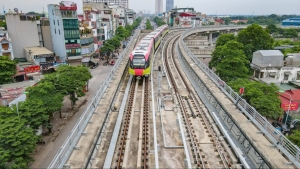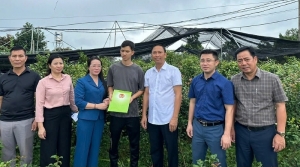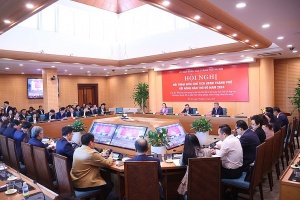Hanoi seeks to transform urban agriculture
The capital city has converted over 40,227 hectares of rice land to new production models. These include more than 15,600ha dedicated to high-quality rice cultivation, nearly 3,000ha allocated for safe vegetable production, around 7,400ha used for fruit tree cultivation, and 285 high-tech agricultural production models spanning various fields.
High-tech agricultural models are concentrated in districts like Me Linh, Gia Lam, Thuong Tin, Dong Anh, Thanh Oai, and Dan Phuong. Some models have initially yielded high economic efficiency, aligning with Hanoi's situation and establishing market positioning.
In livestock breeding, Hanoi has developed focused areas, with 12 communes for dairy cattle and 15 communes for meat cattle. The city has 722 pig farms outside residential areas, averaging 1.1ha per household; 2,147 poultry farms with an average area of 8,800 sq.m per farm; and nine cooperatives operating in livestock production.
 |
| Photo: baodautu.vn |
Hanoi's urban agriculture also faces numerous challenges. In recent years, agricultural land has decreased by nearly 800ha due to urban space expansion and infrastructure project implementations. Many production areas remain fragmented, failing to form concentrated commodity-oriented production zones applying high technologies.
Additionally, planning work remains inadequate, lacking comprehensive coordination between regions. This reduces land use efficiency and sustainable development potential for urban agriculture.
On November 30, Hanoi Department of Agriculture and Rural Development organised a workshop on solutions for urban agriculture development in the city.
At the workshop, Truong Van Quang, deputy secretary-general of the Vietnam Urban Planning and Development Association said, "Hanoi's peri-urban agricultural areas, located in the urbanisation zone 2, encompass six districts: Gia Lam, Dong Anh, Me Linh, Dan Phuong, Hoai Duc, and Thanh Tri. These districts, positioned near urban administrative units, are either slated to become urban districts or are included in the city's urban development plans."
Urban agricultural spaces still occupy a significant proportion of total natural area through diversified forms. However, there is a tendency towards specialised conversion similar to urban agricultural spaces in urban districts.
This is a space constantly experiencing land and functional changes due to direct urbanisation impacts. Thus, while urban agricultural development has potential and advantages compared to urban core areas, it also has certain limitations.
According to Quang, Hanoi needs to focus on restructuring, enhancing agricultural production efficiency, developing ecological and high-tech agriculture, and striving to become a leading locality in ecological agriculture, modern rural development, and civilised farmers, while preserving and promoting traditional cultural and historical values.
Simultaneously, the city should prioritise building green belts to ensure living environments. Special attention should be given to developing seed technologies, post-harvest preservation and processing technologies, and linking these with product market development.
At the conference, Prof. Tran Duy Quy emphasised that urban agricultural development in Hanoi must be based on comprehensive socioeconomic development and land use planning. The goal is to create a balanced, rational structure among agricultural ecosystem elements while making positive environmental contributions.
“Urban areas should focus on developing high-economic-value sectors such as flowers, ornamental plants, and safe vegetables," Quy said.
According to Quy, reviewing and adjusting land use planning is an urgent requirement. Hanoi needs to convert low-productivity and low-economic-efficiency agricultural lands to higher-value purposes, prioritising concentration and specialised cultivation. This will optimise land use and ensure sustainable, effective urban agricultural development.
 | Hanoi to develop comprehensive and modern urban metro lines Hanoi plans to invest over $55 billion to build a synchronised and modern urban railway network. |
 | North Hanoi Smart City strives to become first carbon-neutral urban area Property development players have signed a deal to help make North Hanoi Smart City the first carbon-neutral urban area in Vietnam. |
 | Hanoi seeks Farmers Association role in developing collective economy Hanoi People's Committee has implemented a plan for members of the Vietnam Farmers' Association to develop a collective economy in the agricultural sector. |
 | Hanoi aims for sustainable agriculture through innovation Hanoi is committed to supporting farmers with cooperative links, digital transformation adoption, and the sustainable development of agriculture and the rural economy, according to the city's leaders. |
What the stars mean:
★ Poor ★ ★ Promising ★★★ Good ★★★★ Very good ★★★★★ Exceptional
Related Contents
Latest News
More News
- Internal strengths attest to commitment to progress (February 19, 2026 | 20:13)
- Vietnam, New Zealand seek level-up in ties (February 19, 2026 | 18:06)
- Untapped potential in relations with Indonesia (February 19, 2026 | 17:56)
- German strengths match Vietnamese aspirations (February 19, 2026 | 17:40)
- Kim Long Motor and AOJ Suzhou enter strategic partnership (February 16, 2026 | 13:27)
- Haiphong welcomes long-term Euro investment (February 16, 2026 | 11:31)
- VIFC in Ho Chi Minh City officially launches (February 12, 2026 | 09:00)
- Norfund invests $4 million in Vietnam plastics recycling (February 11, 2026 | 11:51)
- Marico buys 75 per cent of Vietnam skincare startup Skinetiq (February 10, 2026 | 14:44)
- SCIC general director meets with Oman Investment Authority (February 10, 2026 | 14:14)

 Tag:
Tag:



















 Mobile Version
Mobile Version